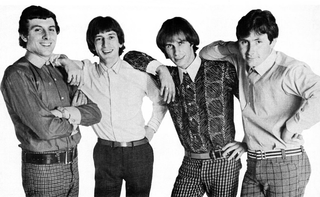
The Troggs are an English garage rock band formed in Andover, Hampshire in May 1964. They had a number of hits in the United Kingdom and the United States. Their most famous songs include the US chart-topper "Wild Thing", "With a Girl Like You" and "Love Is All Around", all of which sold over 1 million copies and were awarded gold discs. "Wild Thing" is ranked No. 257 on the Rolling Stone magazine's list of The 500 Greatest Songs of All Time and was an influence on garage rock and punk rock.
"Hang On Sloopy" is a 1964 song written by Wes Farrell and Bert Berns. Rhythm and blues vocal group the Vibrations were the first to record the tune in 1964. Atlantic Records released it as a single, which reached No. 26 on the Billboard Hot 100 chart.

The Music Machine was an American rock band formed in Los Angeles, California in 1966. Fronted by chief songwriter and lead vocalist Sean Bonniwell, the band cultivated a characteristically dark and rebellious image reflected in an untamed musical approach. Sometimes it made use of distorted guitar lines and hallucinogenic organ parts, punctuated by Bonniwell's distinctively throaty vocals. Although they managed to attain national chart success only briefly with two singles, the Music Machine is today considered by many critics to be one of the groundbreaking acts of the 1960s. Their style is now recognized as a pioneering force in proto-punk; yet within a relatively short period of time, they began to employ more complex lyrical and instrumental arrangements that went beyond the typical garage band format.
Pickwick Records was an American record label and British record distributor known for its budget album releases of sound-alike recordings, bargain bin reissues and repackagings under the brands Design, Bravo, Hurrah, Grand Prix, and children's records on the Cricket and Happy Time labels.
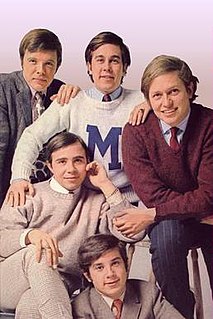
Every Mother's Son was an American sunshine pop band formed in New York City in 1966. Coming from a folk rock background situated in Greenwich Village, the group scored their only Top 40 hit "Come On Down to My Boat" in 1967. Following their brief commercial success, Every Mother's Son achieved lesser fortunes with songs such as "Put Your Mind at Ease" and "Pony with the Golden Mane", and recorded two studio albums before disbanding in 1968.
Kenny and the Kasuals were an American garage rock band formed in Dallas, Texas in 1964. The band played at various venues, including the Studio Club, with a repertoire that consisted of material taken from the British Invasion and R&B standards. Over time the band began experimenting with early elements of psychedelic music and are often cited as one of the first groups to play in such a style. Kenny and the Kasuals released several singles including their best-known song, "Journey to Tyme". A live album, Impact, was also recorded in 1966.

The Gentlemen were an American garage rock band from Dallas, Texas, who were active from 1964 to 1968. They are best known for their 1966 song, "It's a Cry'n Shame", which has been recognized as one of the greatest songs in garage rock. The band is noted for the contributions of guitarist and songwriter, Seab Meador. Jimmie Vaughan, later a member the Fabulous Thunderbirds and brother of Stevie Ray Vaughan, served a brief stint for several months in the Gentlemen in late 1965 and early 1966, but did not appear on any of their recordings. He went on to play in another Dallas garage rock band, the Chessmen.
"It's a Cry'n Shame" is a song written by Seab Meador and Mike Kelley and was recorded in 1966 by the Gentlemen, an American garage rock band from Dallas, Texas who were active between 1964 and 1968. It was originally released as the B-side to "You Can't Be True" but has become by far the better-known song. "It's a Cry'n Shame" has been included in several garage rock compilations and is now recognized as one of the greatest songs in the genre.

The Basement Wall was an American garage rock band from Baton Rouge, Louisiana, who were active in the 1960s. The group spent much of their career touring in Texas, and eventually became among the most recognized live acts in the southern regional rock scene. All of the band's recorded material was featured on a compilation album in 1985. In 2005, they briefly reunited with their original members for a concert to mark the occasion of their induction into the Louisiana Entertainment Hall of Fame.

Sir Winston and the Commons were an American garage rock band formed in Indianapolis, Indiana, in 1963. The group released two highly regarded singles, which, upon release, earned the band a regional following, and resulted in reinterest in their music over the years. At the height of their popularity, Sir Winston and the Commons were regulars at the teen dance club the Cellar, in Chicago.

Novas were an American garage rock band from Dallas/Fort Worth, Texas, who were active in the 1960s. Noted for their harmonies, they became one of the most popular bands in the local area and toured throughout the Texas, Oklahoma, and Louisiana region, enjoying a following outside of their immediate vicinity. The group released a single featuring the song "William Junior" in 1966. In the intervening years since their breakup, the Novas' music has come to the attention of garage rock collectors and enthusiasts and their collected work is included on two anthologies.

The Quests were an American garage rock band formed in Grand Rapids, Michigan, in 1964. Recording for Fenton Records between 1966 and 1967, the group released three singles in their career. Although the group was hampered by a lyrical controversary surrounding one of their tunes, they achieved regional popularity among their teen fanbase with the original songs "Scream Loud" and "Shadows in the Night". Since the Quests' disbandment, their material has been well-documented on garage rock compilation albums and prompted surviving members to occasionally reunite.
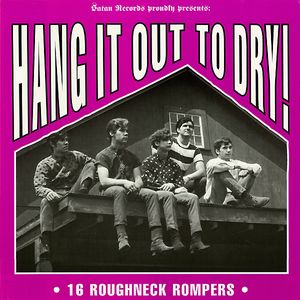
Hang It Out to Dry! is a compilation of garage rock recordings from the 1960s first issued by Satan Records in 1994 which is available in two versions, both on LP and in extended form on CD. It features some of the more upbeat and rocking examples of the genre.
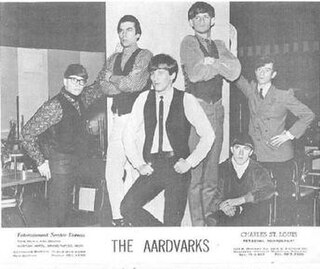
The Aardvarks were an American garage rock band from Muskegon, Michigan who were active between 1964-1968. They were one of the most popular groups in the Muskegon area and recorded three singles, two of which were issued on labels of Dave Kalmback's Fenton Records based out of Sparta, Michigan. The group scored a local hit with "I'm Higher than I'm Down", which is now considered a garage rock classic, and their work is highly regarded by collectors and enthusiasts.

The Rising Tydes were an American garage rock band formed in Philadelphia, Pennsylvania, in 1965. Hyped to be a breakout national success, the Rising Tydes appeared in numerous television programs and performed extensively throughout the city. Although such widespread success eluded the group, they are still remembered for their rebellious live appearances and a single, "Artificial Peace", which was released in 1967. Both songs on the record have since been re-released on a compilation album.

Euphoria's Id was an American garage rock band formed in Saco, Maine, in 1963. Remembered as a popular live attraction in the New England teen scene, the group released two singles in their recording career, including the band's highly regarded cover version of "Hey Joe". A heavily favored inclusion on the New England Teen Scene compilation album series, a retrospective album was released in response to Euphoria's Id's reinterest.
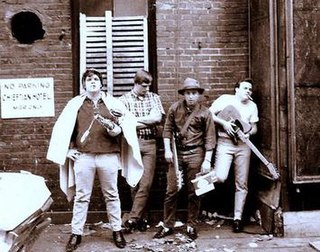
The Brymers were an American garage rock band from San Joaquin Valley, California, who were active in the 1960s. They had a regional hit with the song "Sacrifice", which also received distribution overseas and managed to garnish airplay in parts of Europe, New Zealand, and Australia. Although they only released one single, they recorded numerous unissued tracks that would subsequently be released on CD between 2007 and 2008. The group reunited in 2007 and have since been active on stage and in the studio, releasing five CDs containing old and new material. "Sacrifice" and their version of "The House of the Rising Sun" were both featured in the film Jobs starring Ashton Kutcher. Their song "I Want to Tell You" was included in a scene from the ABC TV series Once Upon A Time.
The Grifs were an American garage rock band from Charlotte, North Carolina, who were active in the 1960s. Their song, "Catch a Ride" became the number one hit in Charlotte and did well in markets around the Carolinas, and reached number one in Birmingham, Alabama. The group was able to secure airplay in northern markets, such as in Lansing, Michigan, where it reached number one, as well as in the Detroit area and parts of Canada. They were invited to open for the Amboy Dukes in Detroit, where they began to play frequent engagements in the Michigan region, and recorded their second single, "Keep Dreaming", in Detroit. Just when the Grifs prospects looked hopeful, drummer Roy Skinner departed and guitarist Mike Wingate received a draft notice to go to Vietnam. By early 1968, the group folded. Their work is now highly regarded by garage rock enthusiasts and several of their songs have appeared on compilations.
The Tamrons were an American garage rock band from Concord, North Carolina, near Charlotte who were active in the 1960s. They became one of the most popular bands in Concord and the Charlotte area during the mid-1960s and enjoyed a regional hit with their single, "Wild Man" backed with "Stop, Look, Listen" recorded at Arthur Smith's studio in Charlotte and released on his Pyramid label. They broke up in 1968. In the intervening years their work has become highly regarded by garage rock enthusiasts and has appeared on several compilations.
The Daybreakers were an American garage rock and psychedelic band from Muscatine, Iowa, who were active in the 1960s. They became one of the most popular bands in their region which included the Quad Cities. Jack Barlow, a popular DJ and country music recording artist had them record songs for a planned single at Columbia Recording Studios arranged a contract with Atlantic Records, who released the group's single on their Dial label featuring "Psychedelic Siren" which included siren sound effects generated by a primitive electronic device. Though the song became a big regional hit in Iowa, Atlantic lost interest in the band and they made no further recordings. In the intervening years, their work has come to the attention of garage rock enthusiasts and has been included of several compilations.













